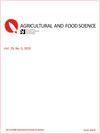可持续有机农业实践
IF 1.1
4区 农林科学
Q3 AGRICULTURE, MULTIDISCIPLINARY
引用次数: 2
摘要
本文的目的是评估有机农业的参与,以扩大有机农业的可持续性。无机食品生产技术中化学品的广泛使用迫使注重健康的人们发现并支持农业中的有机耕作方法。特别是在较贫穷的国家,可持续有机农业可以促进有意义的社会经济和经济可持续发展。有机信念的目标意味着对当地资源(例如当地种子品种,肥料等)进行充分的知情管理,从而提高成本效率。有机农业最大限度地降低了产量失败的风险,减轻了小农家庭生活中的回报和创新。有机农业显示出丰富的效益,因为它减少了传统农业的许多环境影响,它可以提高小农田地的效率,它减少了对昂贵的外部投入的依赖,并保证了有机产品的溢价。有机农民也从农民合作社和社会网络的形成中获利,这增加了获得教育、信贷和福利服务的机会。本文介绍了有机农业的功能如何有助于可持续实践和改善环境保护,动物福利和产品质量。本文章由计算机程序翻译,如有差异,请以英文原文为准。
Sustainable Organic Farming Practices
The aim of the paper is to assess the involvement of organic farming to amplify the sustainability of Organic agriculture. Widespread use of chemicals in inorganic food production technology compelled the health careful people to discover and support organic farming methods in agriculture. Particularly in poorer countries sustainable Organic Farming can throw in to meaningful socio-economic and economically sustainable development. The goal of organic beliefs which means well-informed management of local resources (e.g. local seed varieties, manure, etc.) and therefore cost efficiency. Organic agriculture minimizes the risk of yield failure, alleviates returns and innovation in the life of small farmers’ families. Organic agriculture shows abundant benefits, as it reduces many of the environmental impacts of conventional agriculture, it can increase efficiency in small farmers’ fields, and it reduces reliance on costly external inputs, and guarantees price premiums for organic products. Organic farmers also profit from farmer cooperative and formation of social networks, which enhances good access to instruction, credit and welfare services. This paper brings out how the function of organic farming contributes for the sustainable practices and improving environment conservation, animal welfare, and product quality.
求助全文
通过发布文献求助,成功后即可免费获取论文全文。
去求助
来源期刊

Agricultural and Food Science
农林科学-农业综合
CiteScore
2.50
自引率
0.00%
发文量
22
审稿时长
>36 weeks
期刊介绍:
Agricultural and Food Science (AFSci) publishes original research reports on agriculture and food research related to primary production and which have a northern dimension. The fields within the scope of the journal include agricultural economics, agricultural engineering, animal science, environmental science, horticulture, plant and soil science and primary production-related food science. Papers covering both basic and applied research are welcome.
AFSci is published by the Scientific Agricultural Society of Finland. AFSci, former The Journal of the Scientific Agricultural Society of Finland, has been published regularly since 1928. Alongside the printed version, online publishing began in 2000. Since the year 2010 Agricultural and Food Science has only been available online as an Open Access journal, provided to the user free of charge. Full texts are available online from 1945 on.
 求助内容:
求助内容: 应助结果提醒方式:
应助结果提醒方式:


